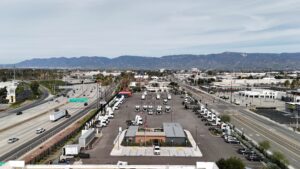PLANO, Texas — Toyota Motor North America and Kenworth Truck Co. say they have proven the capabilities of their jointly designed heavy-duty, Class 8 fuel cell electric vehicles (FCEVs) as a potential zero-emissions replacement of diesel-powered trucks.
According to a news release, “the primary goal for Toyota and Kenworth’s participation in the project was to nearly match the performance of diesel-powered drayage trucks while eliminating emissions to provide a sustainable solution in heavy-duty transportation.”
The baseline for the Toyota-Kenworth T680 FCEV truck – codenamed “Ocean” – was a 2017 diesel engine operating about 200 miles a day, the news release stated.
The T680 FCEV has a range of about 300-plus miles when fully loaded to 82,000 pounds. With no downtime between shifts for charging and the short 15-to 20-minute fill time, the FCEVs could run multiple shifts a day and cover up to 400 to 500 miles, the companies stated.
Kenworth designed and built the Class 8 T680 FCEVs, while Toyota designed and built the powertrain’s fuel cell electric power system powered by hydrogen. The Ocean trucks reduced Greenhouse Gases (GHG) by 74.66 metric tons of CO2 per truck annually compared to the baseline diesel engine, the companies claim.
“Having a successful demonstration of Toyota’s scaled fuel cell electric power supply with real-world operations for actual customers opens the door to even broader future deployment, as the use of hydrogen helps to eliminate CO2 from heavy-duty transport while offering a cleaner alternative that keeps the vehicles in service, a win for all parties,” said Andrew Lund, Toyota chief engineer of zero emission advanced product planning. “The potential for this technology as a replacement for higher-emission powertrains is real and supports both regulatory and society iniatives to combat climate change while helping us achieve our own goals of carbon neutrality.”
Although the overall Zero-and Near Zero-Emission Freight Facilities (ZANZEFF) project is anticipated to conclude later this year, the recently concluded “Shore to Store” project funded under ZANZEFF was proposed with support from Toyota, Kenworth and Shell and funded with a $41 million grant awarded by the California Air Resources Board. The grant was part of the California Climate Investments, a California initiative that puts billions of cap-and-trade dollars to work reducing greenhouse gas emissions.
“Through the Shore to Store project, we demonstrated how Toyota’s advanced zero-emission hydrogen fuel cell technology could be scaled and used in our Kenworth T680,” said Joe Adams, Kenworth’s chief engineer. “We clearly showed that hydrogen is a viable clean fuel capable of powering commercial transportation for customers, matching diesel performance in range and power, with quick refueling for minimal downtime and smooth, quiet operation.”
The 10 Ocean trucks for this project were operated by customers including, among others, Toyota Logistics Services, Total Transportation Services Inc. and Southern Counties Express.
“With the completion of this project, the door is now open for the technology to be adopted more widely for use in other heavy-duty applications, including increasing use of heavy-duty trucks in commercial transportation,” the news release stated.
The Port of Los Angeles is the busiest container port in North America. The medium-duty and heavy-duty trucks across the state — like those in operation at the port — only constitute about 3% of total vehicles in California, yet they are responsible for roughly 23% of the state’s on-road Greenhouse Gas Emissions, according to the news release.
The Port of Los Angeles has announced that it hopes to transition drayage fleets to zero-emission powertrains by 2035 and recently announced the Clean Truck Fund to help support this transition. The port and the surrounding region were an ideal location to demonstrate the fuel cell electric heavy-duty trucks as part of transport operations.
“Collaborating with original equipment manufacturers like Toyota and Kenworth on this demonstration project is an important step toward bringing next-generation technologies to market,” Port of Los Angeles Executive Director Gene Seroka said. “We’re grateful to CARB for its generous grant to support this effort and look forward to additional zero emission vehicles operating at the Port of Los Angeles.”
Shell contributed to the project by building a total of three hydrogen stations (two ZANZEFF and one additional in the operating region), the first public provider in California to fuel heavy-duty trucks. With the set routes for the trucks’ drayage operations, the stations were regularly used, providing quick refueling to keep the trucks in operation.
“Shell anticipates a great use-case for hydrogen in Commercial Road Transport here in California and the success of the ZANZEFF project has been an important step in achieving commercialization,” Wayne Leighty, commercial head of Shell Hydrogen Mobility in North America, said. “Collaborations across both the private and public sectors is key to advancing zero-emissions heavy-duty mobility, and we are grateful to CARB, Port of Los Angeles, and ZANZEFF members for their support.”
Toyota plans to produce fuel-cell powertrain modules at its Kentucky manufacturing plant beginning in 2023.
The Trucker News Staff produces engaging content for not only TheTrucker.com, but also The Trucker Newspaper, which has been serving the trucking industry for more than 30 years. With a focus on drivers, the Trucker News Staff aims to provide relevant, objective content pertaining to the trucking segment of the transportation industry. The Trucker News Staff is based in Little Rock, Arkansas.











